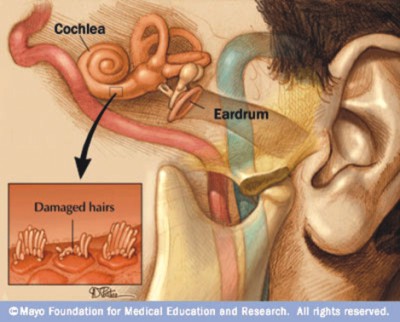|
Health
MP3 Players can cause Hearing Loss
Portable music devices put your hearing at risk. Follow these tips to safeguard your hearing while enjoying music on the go.
IPods and other portable music devices have changed the way many people listen to music. As the popularity of these devices continues to rise, hearing experts worry that the number of people with hearing loss will become as commonplace as the devices themselves.
Hearing experts are concerned that hearing loss will take place because exposure to music through these devices can be both loud and long. With the new MP3 players, such as the iPod, significant improvements in sound quality are possible in smaller and more portable devices. Sound quality, portability and convenience translate into more time spent listening to music, which makes the potential for damage even greater.
"With the older devices, like the Walkman, if you turned them up all the way, they sounded very bad, so people didn't do it. Now, they don't sound bad at maximum volume, and that could pose a problem," says Jodi Cook, Ph.D., director of the hearing aid program at Mayo Clinic, Rochester, Minn.
Although any hearing loss that occurs may not be apparent for years, once that damage occurs, it's permanent and irreversible.

Music played at loud volumes so close to your inner ear can damage the hairs cells in your ear, causing permanent hearing loss.
How MP3 players can cause hearing loss
Music and other loud noises cause hearing loss by damaging the hair cells in the cochlea, a part of your inner ear that helps transmit sound information to your brain. These hair cells can often recover from temporary damage. If you've ever been to a rock concert and your hearing sounded muffled for the next day or two, you've experienced temporary damage to these hair cells.
But extremely loud noise, such as a gunshot, or moderately loud noise that continues for long periods of time, can permanently damage these hair cells. Once these hairs are destroyed, they don't come back and at least partial hearing loss occurs.
Any sound above 90 decibels (db) may cause some hearing loss if the exposure is prolonged. But most portable music players can produce sounds up to 120 db. That's louder than a lawn mower or a chain saw and equivalent to an ambulance siren.
The problem is that you don't feel hearing loss occurring. You won't know until years later that some of your hearing has been permanently destroyed.
Preventive strategies
To address such concerns, some product manufacturers have been touting products such as noise-cancelling earphones. The theory is that if you don't hear background noise, you won't need to turn up the volume to block out those sounds. If you aren't increasing the volume to cover background noise, though, standard earphones are probably fine.
Debate continues over whether in-ear or over-the-ear earphones are better. One study found that in-ear earphones can increase the decibel level between 7 and 9 db. Earphones that sit over your ear, with their lower decibel range, may therefore be slightly safer.
None of this means you can't enjoy your music on the go. Listening to sounds of 80 db or less, even for long periods of time, isn't likely to cause damage. Dr. Cook says that if you keep the volume at a level where you can still comfortably carry on a conversation, you won't need to limit the amount of time you listen to your music. She also recommends that you never turn the volume all the way up.
How do you know your music's too loud?
While you can't measure the decibel level of your music, there are some simple ways to tell if your volume is too high. Your music is too loud if:
* Your MP3 player volume is set higher than 60 percent of the maximum
* You can't hear conversations going on around you
* People near you can hear your music
* You find yourself shouting instead of talking when you respond to people nearby
By taking steps to protect your hearing now, such as turning your music down, you can ensure that you'll be able to enjoy your music on the go for many years to come.
Source: mayoclinic.com
Copyright
(R) thedailystar.net 2006 |
